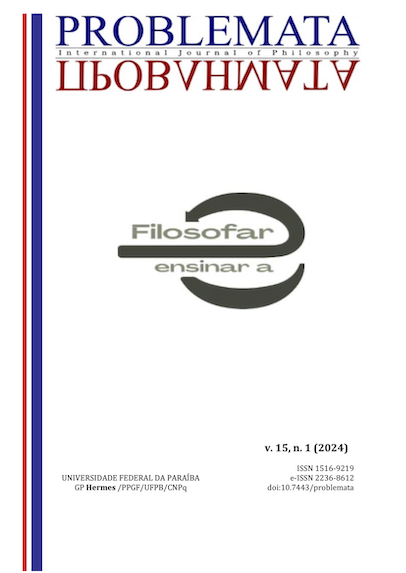ENSEÑAR A ENSEÑAR FILOSOFÍA COMO PROBLEMA FILOSÓFICO:
APUNTES PARA UN DEBATE EN LA FORMACIÓN DE PROFESORAS Y PROFESORES DE FILOSOFÍA
DOI:
https://doi.org/10.7443/problemata.v15i1.70252Keywords:
Formacíon docente, Problema filosófico, Orientación de fundamentoAbstract
Este artículo recupera los aspectos centrales y constitutivos de tres perspectivas de formación de profesoras y profesores, institucionalizadas en Argentina y discutidas en un texto de 2008 con la denominación: la orientación didáctica, la orientación filosófico-didáctica y la orientación de fundamento. Se pretende, con esta retomada, profundizar en la tercera perspectiva, mostrando que la concepción de la enseñanza de la filosofía como un problema filosófico, que resonó tanto en Argentina como en Brasil, concierne a la subjetividad docente que pone en juego la producción y reproducción de la filosofía y, más que eso, las relaciones que cada profesor y cada profesora tienen con la filosofía al enseñarla.
Downloads
References
AGRATTI, L. “Apuntes para pensar un giro copernicano en el enseñara enseñar filosofía” en Grau, Olga y Bonzi, Patricia (editoras), Grafías filosóficas. Problemas actuales de la Filosofía y su enseñanza, Santiago de Chile, Cátedra UNESCO de Filosofía. Fac. de Filosofía y Humanidades Universidad de Chile, 2008.
CERLETTI, A. “Ensinar filosofía; da pregunta filosófica à proposta metodológica” en Kohan, Walter (org.) Filosofia. Caminhos para su ensino, Río de Janeiro, Lamparina, 2004.
FRASSINETI, M. y OBIOLS, G. La enseñanza filosófica en la escuela secundaria, Bs. As., A-Z, 1991.
NOUSSAN-LETTRY, L., Cuestiones de enseñanza y de investigación en filosofía, Mendoza, Univ. Nacional de Cuyo, 1973.
OBIOLS, G. “Las grandes modalidades de la enseñanza filosófica” en Obiols, G. y Frassineti, M., La enseñanza filosófica en la escuela secundaria, Bs. As., A-Z editora, 1993.
OBIOLS, G. Una introducción a la enseñanza de la filosofía, Bs. As.,FCE, 2002.
SALAZAR BONDY. Didáctica de la Filosofía, Lima, Universo, 1968.
Downloads
Published
Issue
Section
License
Copyright (c) 2024 Laura Agratti

This work is licensed under a Creative Commons Attribution 4.0 International License.
Authors who publish with this journal agree to the following terms:
- Authors retain copyright and grant the journal right of first publication with the work simultaneously licensed under a Creative Commons Attribution License that allows others to share the work with an acknowledgement of the work's authorship and initial publication in this journal.
- Authors are able to enter into separate, additional contractual arrangements for the non-exclusive distribution of the journal's published version of the work (e.g., post it to an institutional repository or publish it in a book), with an acknowledgement of its initial publication in this journal.
-
- Authors are permitted and encouraged to post their work online (e.g., in institutional repositories or on their website) prior to and during the submission process, as it can lead to productive exchanges, as well as earlier and greater citation of published work (See The Effect of Open Access).





